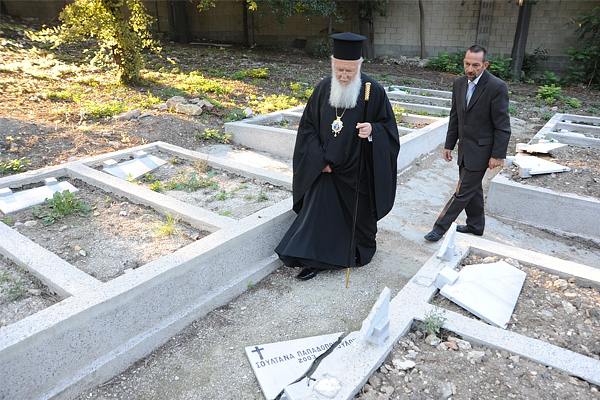About 90 tombstones are broken.
Incidents of this nature are not rare in the city, but the
local press failed to report it. Only recently and through a
movie, have young Turks begun to learn about past anti-Christian
pogroms. Ecumenical patriarch Bartholomew visits the
cemetery in question.

Photo: Nikos Manginas
Istanbul (AsiaNews)
– A Christian cemetery was desecrated in Istanbul. Unknown
person or persons broke 90 tombstones that bore the sign of
the cross and the name of the deceased. The incident
occurred a few days ago in the historic cemetery of Valukli
near the ancient Valukli Monastery, the only monastery
dedicated to Our Lady still open in Istanbul, located
outside the ancient walls of Theodosius, and which five non-resident
nuns care for.
Istanbul’s Christian cemeteries have been
desecrated on a number of occasions in the past 20 years.
The latest outrage brought back memories of the tragic
events of September 1955 when churches, cemeteries and
properties owned by Istanbul’s Orthodox community were
desecrated and destroyed in a pogrom. Eventually dubbed the
September pogrom, the event was the brainchild of Turkey’s
political-bureaucratic-military establishment, known here as
Derin Devlet or ‘deep state’.
The pogrom has remained engraved in the memories
of Istanbul’s Christians who at that moment realized that
their survival in the city would be difficult, if not
impossible.
Young Turks have learnt about such tragic
episodes only recently, when Guz Sancisi, a movie
by young Turkish woman director Tomris Giritlioglu, was
screened in local theatres to great review and box office
success.
It is also important to keep in mind that
Christian cemeteries are very large and serve as a reminder
of the small Christian presence in this country.
Given Istanbul’s huge urban development,
Christian cemeteries have become surrounded by human
habitation and are coveted by developers.
A law adopted in the 1930s transferred titles to
cemeteries to municipalities; hitherto, they had belonged to
religious foundations
Outraged and grieved by what happened, the
Ecumenical Patriarch Bartholomew (pictured) went to
see the desecrated cemetery, asking why such acts continue
to strike Christian graveyards.
Despite the seriousness of the incident, the
local press did not report it.